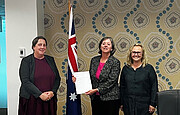Mitteilung
Die ESO und Australien stärken ihre strategische Partnerschaft
10. Februar 2022
Am 9. Februar unterzeichneten die ESO und Australien eine Zusatzvereinbarung, um den Umfang ihrer strategischen Partnerschaft zu erweitern. Aufgrund dieser erweiterten Vereinbarung wird Australien dem Technologieentwicklungsprogramm der ESO beitreten, was bedeutet, dass australische Unternehmen und Institutionen berechtigt sind, mit der ESO bei der Entwicklung zukünftiger Technologien für bodengestützte Teleskope zusammenzuarbeiten.
Australien ist seit 2017 ein strategischer Partner der ESO. Die Partnerschaft gewährt australischen Astronomen und der Industrie Zugang zur hochmodernen Forschungsinfrastruktur der ESO an den Observatorien La Silla und Paranal, einschließlich Teleskopen wie dem Very Large Telescope der ESO oder dem 3,6m-Teleskop der ESO [1]. Zusätzlich haben sie die Möglichkeit, mit Einrichtungen der ESO-Mitgliedstaaten bei der Entwicklung von Instrumenten für diese Observatorien zusammenzuarbeiten.
Die heute unterzeichnete Vereinbarung wird diese Partnerschaft weiter stärken, indem sie Australien die Teilnahme am Technologieentwicklungsprogramm der ESO ermöglicht. Dieses 2014 gestartete Programm bringt Ingenieure der ESO und der Industrie zusammen, um künftige Technologien für die bodengebundene Astronomie in Bereichen wie verformbaren Spiegeln, Detektoren oder Lasern zu entwickeln. Zumeist werden die Technologien bei der ESO in Zusammenarbeit mit externen Unternehmen, Universitäten und Instituten in ganz Europa entwickelt – ein sehr vielfältiger Pool von Vertragspartnern, der nun auf Australien ausgeweitet wird.
Die Vereinbarung wurde vom Generaldirektor der ESO, Xavier Barcons, und der australischen Ministerin für Wissenschaft und Technologie, Melissa Price, während einer Zeremonie unterzeichnet, die aufgrund von Einschränkungen im Zusammenhang mit der COVID-19-Pandemie online stattfand. Die Änderung stärkt die technische und wissenschaftliche Zusammenarbeit der ESO mit Australien. Sie fördert die Wissenschaftsdiplomatie und bietet eine Grundlage für künftige Diskussionen über die Mitgliedschaft, während sie den australischen Instrumentenbauern und der Industrie neue Möglichkeiten zur Entwicklung spannender Technologien bietet.
Generaldirektor Barcons sagte: "Ich freue mich sehr, eine Vereinbarung zu unterzeichnen, die die Beziehungen zwischen der ESO und Australien stärkt. Indem wir das Land im Technologieentwicklungsprogramm der ESO willkommen heißen, eröffnen wir den australischen Forschungseinrichtungen und Hightech-Industrien neue Möglichkeiten, gemeinsam mit der ESO spannende Technologien zu entwickeln. Ich freue mich darauf, das Engagement zwischen Australien und der ESO durch diese Vereinbarung zu fördern."
Ministerin Price betonte: "Die Strategische Partnerschaft bringt Australien und der ESO bereits wichtige Vorteile. Die heutige Änderung öffnet neue Türen für australische Institutionen und Unternehmen, um einzigartige Fähigkeiten und Know-how zur Entwicklung der zukünftigen Teleskope und Instrumente der ESO beizutragen und gleichzeitig ihre eigenen technischen Fähigkeiten zu verbessern. Australien freut sich auf die Teilnahme am Technologieentwicklungsprogramm der ESO und weiß dieses wertvolle Angebot der ESO zu schätzen."
Fußnoten
[1] Die Forschungsinfrastrukturen der ESO, zu denen australische Astronomen und Unternehmen Zugang haben, sind: das Very Large Telescope (VLT), das Very Large Telescope Interferometer (VLTI), das Visible and Infrared Survey Telescope for Astronomy (VISTA), das VLT Survey Telescope (VST), das ESO 3,6-Meter-Teleskop und das New Technology Telescope (NTT).
Kontaktinformationen
Bárbara Ferreira
ESO Media Manager
Garching bei München, Germany
Tel: +49 89 3200 6670
Email: press@eso.org
Über die Mitteilung
| ID: | ann22002 |
Our use of Cookies
We use cookies that are essential for accessing our websites and using our services. We also use cookies to analyse, measure and improve our websites’ performance, to enable content sharing via social media and to display media content hosted on third-party platforms.
ESO Cookies Policy
The European Organisation for Astronomical Research in the Southern Hemisphere (ESO) is the pre-eminent intergovernmental science and technology organisation in astronomy. It carries out an ambitious programme focused on the design, construction and operation of powerful ground-based observing facilities for astronomy.
This Cookies Policy is intended to provide clarity by outlining the cookies used on the ESO public websites, their functions, the options you have for controlling them, and the ways you can contact us for additional details.
What are cookies?
Cookies are small pieces of data stored on your device by websites you visit. They serve various purposes, such as remembering login credentials and preferences and enhance your browsing experience.
Categories of cookies we use
Essential cookies (always active): These cookies are strictly necessary for the proper functioning of our website. Without these cookies, the website cannot operate correctly, and certain services, such as logging in or accessing secure areas, may not be available; because they are essential for the website’s operation, they cannot be disabled.
Functional Cookies: These cookies enhance your browsing experience by enabling additional features and personalization, such as remembering your preferences and settings. While not strictly necessary for the website to function, they improve usability and convenience; these cookies are only placed if you provide your consent.
Analytics cookies: These cookies collect information about how visitors interact with our website, such as which pages are visited most often and how users navigate the site. This data helps us improve website performance, optimize content, and enhance the user experience; these cookies are only placed if you provide your consent. We use the following analytics cookies.
Matomo Cookies:
This website uses Matomo (formerly Piwik), an open source software which enables the statistical analysis of website visits. Matomo uses cookies (text files) which are saved on your computer and which allow us to analyze how you use our website. The website user information generated by the cookies will only be saved on the servers of our IT Department. We use this information to analyze www.eso.org visits and to prepare reports on website activities. These data will not be disclosed to third parties.
On behalf of ESO, Matomo will use this information for the purpose of evaluating your use of the website, compiling reports on website activity and providing other services relating to website activity and internet usage.
Matomo cookies settings:
Additional Third-party cookies on ESO websites: some of our pages display content from external providers, e.g. YouTube.
Such third-party services are outside of ESO control and may, at any time, change their terms of service, use of cookies, etc.
YouTube: Some videos on the ESO website are embedded from ESO’s official YouTube channel. We have enabled YouTube’s privacy-enhanced mode, meaning that no cookies are set unless the user actively clicks on the video to play it. Additionally, in this mode, YouTube does not store any personally identifiable cookie data for embedded video playbacks. For more details, please refer to YouTube’s embedding videos information page.
Cookies can also be classified based on the following elements.
Regarding the domain, there are:
- First-party cookies, set by the website you are currently visiting. They are stored by the same domain that you are browsing and are used to enhance your experience on that site;
- Third-party cookies, set by a domain other than the one you are currently visiting.
As for their duration, cookies can be:
- Browser-session cookies, which are deleted when the user closes the browser;
- Stored cookies, which stay on the user's device for a predetermined period of time.
How to manage cookies
Cookie settings: You can modify your cookie choices for the ESO webpages at any time by clicking on the link Cookie settings at the bottom of any page.
In your browser: If you wish to delete cookies or instruct your browser to delete or block cookies by default, please visit the help pages of your browser:
Please be aware that if you delete or decline cookies, certain functionalities of our website may be not be available and your browsing experience may be affected.
You can set most browsers to prevent any cookies being placed on your device, but you may then have to manually adjust some preferences every time you visit a site/page. And some services and functionalities may not work properly at all (e.g. profile logging-in, shop check out).
Updates to the ESO Cookies Policy
The ESO Cookies Policy may be subject to future updates, which will be made available on this page.
Additional information
For any queries related to cookies, please contact: pdprATesoDOTorg.
As ESO public webpages are managed by our Department of Communication, your questions will be dealt with the support of the said Department.






